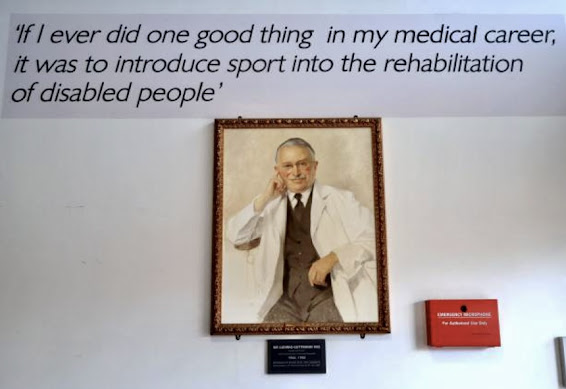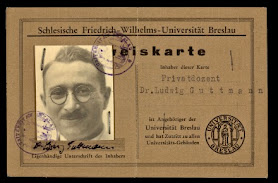By Mary Dodge Allen
Dr. Ludwig Guttmann was already a renowned neurosurgeon when he escaped from Nazi Germany and resettled in Britain. He went on to develop a revolutionary new treatment for people with spinal cord injuries - competitive sports!
Dr. Guttmann's Early Life; Work in Germany; Nazi Oppression
Born on July 3, 1899, in Tost, Germany (now Toszek in Poland), Ludwig Guttmann was raised in an Orthodox Jewish family. His grandparents were farmers, and Guttmann’s early interest in medicine came from observing his grandmother, who was a healer. She wasn’t trained as a nurse, but she grew medicinal herbs and knew how to use them to treat the illnesses of people in her community.
In 1933, Hitler and the Nazi party gained control of Germany and began systematically persecuting Jews. Under the Nuremberg Laws, Jewish doctors were forbidden to work at Aryan hospitals. Dr. Guttmann transferred to the Jewish Hospital in Breslau to work as a neurologist and became the hospital’s Medical Director in 1937.
On November 9, 1938 – Kiristallnacht – Dr. Guttmann defied the Nazi laws prohibiting Jewish doctors from treating Aryan patients. He ordered his staff to treat every injured person who entered the hospital, regardless of ethnicity.
The next morning, Gestapo agents came to inspect the hospital. The suspicious agents questioned Dr. Guttmann about the unusually large number of admissions. Dr. Guttmann’s daughter Eva recalled how he misled and distracted the Gestapo:
“He took the Gestapo from bed to bed, justifying each man’s medical condition. He pulled faces and grimaced at the patients from behind their backs, signaling to [the patients] to pull the same expressions and then saying, ‘Look at this man; he’s having a fit!’”
Escape from Nazi Germany
Nazi officials had confiscated Dr. Guttmann’s passport and had forbidden him to travel. But his opportunity to escape came in 1939, when Joachim von Ribbentrop, Germany’s Minister of Foreign Affairs, ordered Dr. Guttmann to travel to Lisbon to treat a friend of Portugal’s dictator, Antonio de Oliveira Salazar.
Dr. Guttmann arranged for his family to travel with him, and he also gained approval to return to Germany via London. When they arrived in London, the Council for Assisting Refugee Academics (CARA) arranged for him and his wife Else, and their children, Dennis and Eva, to remain in Britain and settle in a Jewish community in Oxford.
Although he was relieved to be free from Nazi oppression, Dr. Guttmann, now 40 years old, faced a career setback. He had been a neurosurgeon in Germany, but he wasn’t allowed to practice medicine in Britain. Instead, he was only allowed to do research at the Department of Neurosurgery in the Radcliffe Infirmary and St. Hugh’s College Military Hospital for Head Injuries.
The Beginning of Sports Therapy
After the outbreak of WWII, British hospitals began filling up with RAF pilots with combat-related spinal injuries, as well as civilians injured by relentless German bombing during the Blitz.
In 1943, the British government asked Dr. Guttmann to establish the National Spinal Injuries Centre at Stoke Mandeville Hospital in Buckinghamshire. It opened in February 1944, and Dr. Guttmann was appointed its Director (an appointment he held until 1966).
At that time, rest and immobilization was the normal treatment, and life expectancy for those with spinal injuries was only two years. Dr. Guttmann refused to accept the notion that a spinal injury was a death sentence. He firmly believed that injured pilots and others could be rehabilitated and return to active lives.
He believed that sporting activities would motivate patients to gain strength, and the competitive games would provide interactions to build self-esteem. The first sport he introduced was wheelchair polo, using walking sticks and a puck. Then came wheelchair basketball, followed by archery, sword fighting and other sports.
Bob Paterson, of the International Wheelchair and Amputee Sports Federation (IWAS) praised Dr. Guttmann:
“After injury, Guttmann focused an individual’s mind on what they can do rather than regretting what they can no longer do. Through sport, Guttmann gave that person back the will to live a full life with pride and self-respect.”
By 1952, the annual Stoke Mandeville Games had more than 130 international competitors. In 1956, the International Olympic Committee awarded Guttmann the Sir Thomas Fearnley Cup, for his service to the Olympic movement. And in 1960, the International Stoke Mandeville Games were held in Rome at the same time as the 1960 Rome Summer Olympics. This is considered to be the first official Paralympic Games.
In 1945, Ludwig Guttmann became a naturalized British citizen. And In 1966, he became Sir Ludwig Guttmann, when he was knighted by Queen Elizabeth II. After he retired in 1966, he continued writing and lecturing on spinal injuries throughout the world. He passed away in March 1980, after a heart attack.
In June 2012, a life-sized bronze statue of Sir Ludwig Guttmann was unveiled at Stoke Mandeville Stadium, as part of the prelude to the 2012 London Summer Paralympics and Olympic Games. His daughter, Eva Loeffler was appointed the mayor of the 2012 Olympic Village.
Sir Ludwig Guttmann’s innovative sports therapy helped countless people to recover from spinal injuries and resume active lives. He encouraged his patients to view their lives in terms of their potential abilities. And his program of competitive sports helped them to develop those abilities.
Have you attended a Paralympic Games event? Do you know someone who has participated?
Mary Dodge Allen is the winner of a 2022 Christian Indie Award, a 2022 Angel Book Award, and two Royal Palm Literary Awards (Florida Writer's Association). She and her husband live in Central Florida, where she has served as a volunteer with the local police department. Her childhood in Minnesota, land of 10,000 lakes, sparked her lifelong love of the outdoors. She has worked as a Teacher, Counselor and Social Worker. Her quirky sense of humor is energized by a passion for coffee and chocolate. She is a member of the Florida Writer's Association, American Christian Fiction Writers and Faith Hope and Love Christian Writers.













Thank you for this post today. It's nice to know how the Paralympics got started! And I appreciated hearing about Dr. Guttmann's life story.
ReplyDelete